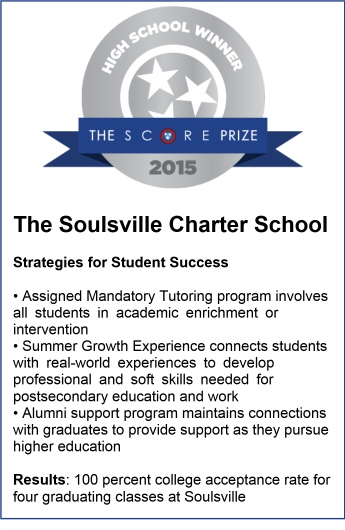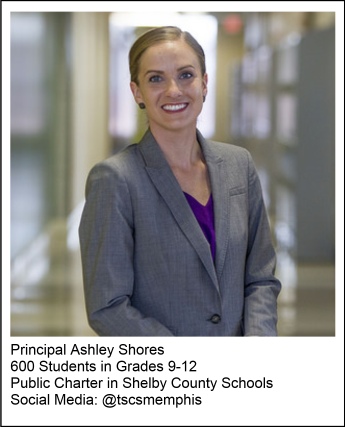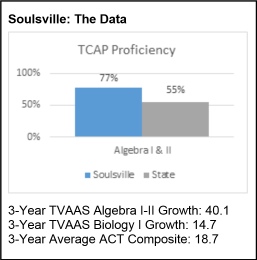Beating the odds. For building confidence and identity, there’s nothing better.
Just ask DeVonte Collins.
Last year, DeVonte – currently a senior at 2015 SCORE Prize high school winner, The Soulsville Charter School in Memphis – had only a 4 percent chance of scoring “proficient” on his end-of-course exam (EOC) in Algebra II, according to the prediction of Tennessee Value-Added Assessment System (TVAAS) scores.
 His score, after a year of very hard work? “Proficient.”
His score, after a year of very hard work? “Proficient.”
DeVonte says Assigned Mandatory Tutoring (AMT) at Soulsville played a part in his success. AMT gave him the chance to spend extra time with the material and get to know his teacher in a small-group setting. AMT was also a pivotal experience for him the year before, when he was a sophomore new to Soulsville and struggling to find confidence in his English class.
“In class, I was getting into material, but I couldn’t raise my hand like I wanted to,” DeVonte said. AMT provided the one-on-one attention he needed. “I got the confidence to ask questions and build relationships with teachers.”
To help students like DeVonte beat the odds, Soulsville has adopted many innovative practices, including excellent academic advising and connections to real-world experiences outside of school. Bryan Hearn, High School Dean of Curriculum and Instruction, said these efforts add up to a school that is always looking for new ways to set students up for success.
“We’re succeeding in a lot of areas and we take pride in that, but we’re not stopping,” Mr. Hearn said. “Just looking at the data points won’t exactly tell you the spirit of our faculty. We’re always trying to get better. We’ve kind of all embodied the spirit of having a growth mindset.”
The AMT program, in particular, has delivered large, measurable gains for many students. AMT was created in response to creative thinking about the master schedule, according to High School Director Ashley Shores. Four years ago, the school day ran until 5 p.m. each day, a demanding schedule for families and staff members alike. School leaders challenged themselves to think more strategically about time spent in school. The result was an overhaul of the master schedule and creation of AMT. Now, regular classes finish at 3:30, then AMT happens until 4:30.
While the school has other tutoring programs, Ms. Shores describes AMT time as “sacred” – a mandatory part of the school day. During AMT, teachers spend time with small groups of students covering high-priority material. Some AMT groups meet continuously throughout the year, and others might convene for only a few weeks, so scheduling is fluid. One program objective is to provide remediation. Kids who are behind in reading, for example, might attend AMT blocks in that subject every day. AMT also provides time for ACT test preparation, as well as extra time for the material covered in Advanced Placement (AP) classes. Every student enrolled in an AP class is automatically placed in an AMT block for that subject as well.
Results from time spent in AMT have been dramatic. AP test scores have risen each year since the program was introduced. Last year, a significant number of AP courses recorded their highest-ever AP test scores, including Soulsville’s first “five” scores. EOC test score growth has also been significant. A vast majority – 92 percent – of AMT students exceeded their EOC projections, or scored “proficient” or “advanced.” Students enrolled in this year’s Reading AMT groups have grown an average of one grade level in reading in just the first two months of the school year, from August through October.
Projections are made using TVAAS reports. The school often shares test score projections with students, then celebrates when those predictions are exceeded.
“We’ve found that data to be really empowering. For students to exceed these projections, it can have a huge impact on their identity,” said Ms. Shores. “We’ve seen things that honestly seem somewhat miraculous.”
AMT is run by Mr. Hearn, who makes sure students know where they’re supposed to be each day. Families receive automated calls and emails each day that a student is scheduled for AMT, and also receive each week’s after-school schedule along with a progress report every Monday.
“We’ve had so many students see improvement that we don’t really get pushback,” said Mr. Hearn.
Soulsville also works beyond the classroom to ensure kids are prepared to succeed in the real world. Every student participates in Summe
r Growth Experiences (SGE), an initiative that connects kids with the wide array of free summer programs offered in Memphis.
“For a lot of students, maybe you’re not inherently invested in the day-to-day academic world of school. But in the summer, you’re in a program where you might get to fly an airplane or job shadow a chef or help take care of animals at the zoo,” Ms. Shores said. “All of a sudden your world is kind of blown up and you know, ‘This is what I want to do. I need to do the best I can in school so I can do this.’”
In addition to having adventures and meeting peers from around the city, Soulsville students gain from SGE the experience of dealing with application processes. Completing essays and application forms, interviewing for programs, arriving on time and prepared for each day of the summer – the process has soft skills and professional experiences embedded throughout. For this reason, students are required to apply to at least three programs each year, even if they already know which one they’ll join.
“If you’re a first-generation college student, the whole application process can be daunting. That can feel like such an overwhelming task,” Ms. Shores said. “If you’ve been filling out applications since you were a ninth-grader to all these summer programs, then you are far less intimidated by that process.”
 Once kids graduate, the school keeps open lines of communication. Soulsville’s alumni support program maintains individualized contact with students – Facebook messages, posts about how-tos and best practices in college – and helps first-generation college students navigate new and difficult terrain. Soulsville has found that help navigating details of life after high school can make all the difference. This is especially true for the first year of college. If students make it through freshman year, they’re much more likely to graduate, Ms. Shores said. But many seemingly small barriers can arise during this transition.
Once kids graduate, the school keeps open lines of communication. Soulsville’s alumni support program maintains individualized contact with students – Facebook messages, posts about how-tos and best practices in college – and helps first-generation college students navigate new and difficult terrain. Soulsville has found that help navigating details of life after high school can make all the difference. This is especially true for the first year of college. If students make it through freshman year, they’re much more likely to graduate, Ms. Shores said. But many seemingly small barriers can arise during this transition.
For example, a student might work hard all through high school, then arrive on a campus and learn she can’t move into her planned student housing because she hasn’t received the right shots. In that situation, if a student doesn’t have $150 and know that she needs to find a Walgreens, college plans can be completely derailed.
“That one little thing makes the difference between matriculating and not matriculating,” Ms. Shores said. “So many barriers arise.”
For DeVonte, who is currently applying to three colleges and plans to study physical therapy, the support he has received from Soulsville is remarkable.
“Because of the area we’re in, you wouldn’t think there would be the support and the love. It’s not like that,” he said. “The teachers love us. They care about us. They want each and every one of us to succeed.”
